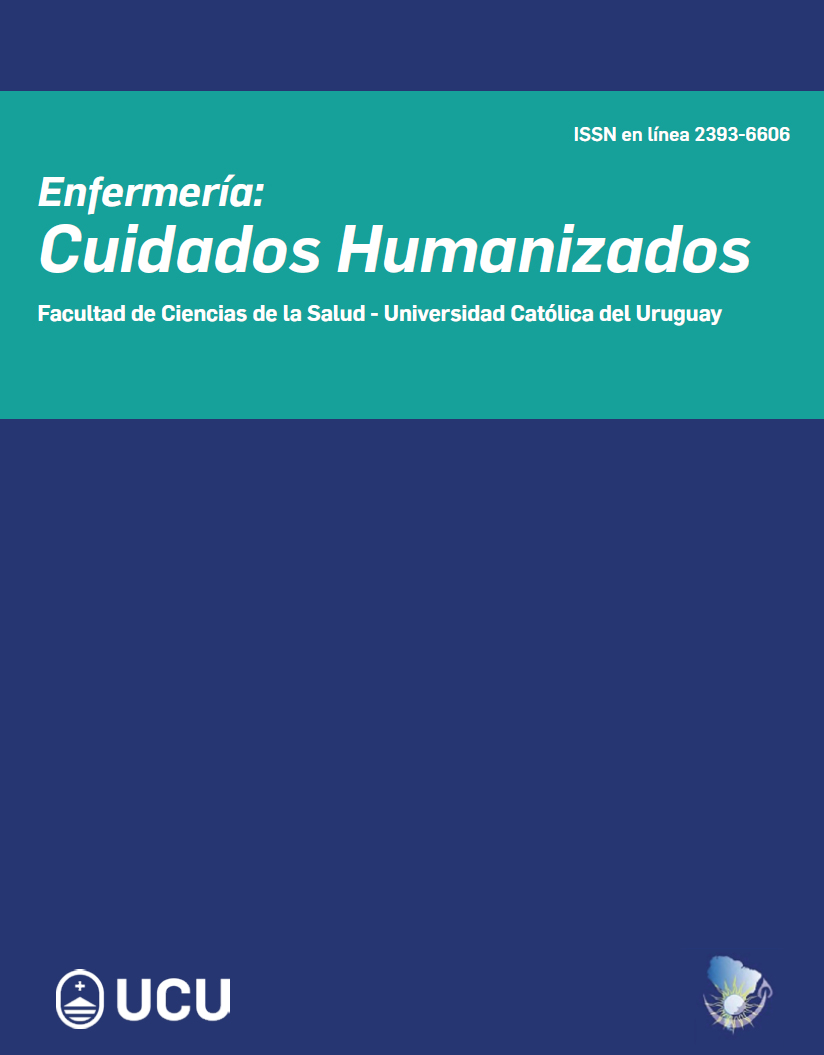Safe Abortion and Public Policies: Impact on Women’s Health
DOI:
https://doi.org/10.22235/ech.v14i2.4619Keywords:
aborto, planejamento familiar, saúde reprodutiva, fatores socioeconômicosAbstract
Introduction: Abortion is a highly relevant topic in public health and human rights, surrounded by ethical, legal, and social debates. Although it is an essential part of reproductive health, many countries maintain restrictive legislation, perpetuating inequalities and vulnerabilities. Criminalization directly impacts women’s physical and psychological health, especially in stigmatized contexts. Objective: To analyze abortion as a family planning practice and its impact on women’s physical and psychological health, considering social, cultural, economic influences, and public policies. Methods: This is an integrative literature review conducted in the PubMed and SciELO databases. Eighteen articles published in the last ten years, in English and Portuguese, addressing abortion, reproductive health, and women’s rights were selected. The studies were analyzed based on their relevance to the investigated aspects, including the impact of legislation, social stigma, and economic vulnerability. Results: The analysis showed that the criminalization of abortion leads to clandestine procedures, increasing the risk of serious complications and maternal mortality. In contrast, in countries where abortion is decriminalized, there are fewer complications and greater access to safe care. Conclusion: Public policies that ensure safe abortion are fundamental for public health, reducing risks to women. It is essential to approach abortion as a health issue rather than a crime.
Downloads
References
1. Silva ATM da, Sousa GD de, Lohmann CM, Ferreira Filho ES, Pinheiro WDS, Soares Júnior JM, et al. Vulnerability in adolescence: a case report of attempted abortion and sexual violence. J Hum Growth Dev. 2017;27(1):117-123. doi: 10.7322/jhgd.127686
2. World Health Organization. Abortion care guideline [Internet]. WHO; 2022. Disponível em: https://www.who.int/publications/i/item/9789240039483
3. United Nations Population Fund. My Body is My Own: Claiming the Right to Autonomy and Self-Determination. State of World Population Report 2021. New York: UNFPA; 2021. Disponível em: https://www.unfpa.org/sowp-2021
4. Coletiva C e S. Mesmo em queda, o aborto ainda é um problema de saúde pública no Brasil SciELO em Perspectiva | Press Releases [Internet]. 2023. Disponível em: https://pressreleases.scielo.org/blog/2023/07/06/mesmo-em-queda-o-aborto-ainda-e-um-problema-de-saude-publica-no-brasil/
5. Diniz D, Castro R. O comércio de medicamentos de gênero na mídia impressa brasileira: misoprostol e mulheres. Cadernos de Saúde Pública. 2011;27(1):94-102. doi: 10.1590/S0102-311X2011000100010
6. Grimes DA. Unsafe abortion: the preventable pandemic. The Lancet [Internet]. 2006;368(9550):1908-1919. doi: 10.1016/S0140-6736(06)69481-6
7. Sedgh G, Singh S, Shah IH, Åhman E, Henshaw SK, Bankole A. Induced abortion: incidence and trends worldwide from 1995 to 2008. The Lancet. 2012;379(9816):625-632. doi: 10.1016/S0140-6736(11)61786-8
8. Souza MT de, Silva MD da, Carvalho R de. Revisão integrativa: o que é e como fazer. Einstein (São Paulo). 2010;8(1):102-106. doi: 10.1590/s1679-45082010rw1134
9. Mitchell RD, O’Reilly GM, Phillips GA, Sale T, Roy N. Developing a research question: A research primer for low- and middle-income countries. African Journal of Emergency Medicine. 2020;10(2):S109-S114. doi: 10.1016/j.afjem.2020.05.004
10. Jacobs MG, Boing AC. O que os dados nacionais indicam sobre a oferta e a realização de aborto previsto em lei no Brasil em 2019? Cadernos de Saúde Pública. 2021;37(12):e00085321. doi: 10.1590/0102-311X00085321
11. Santos A, Coelho E, Gusmão M, Silva D, Marques P, Almeida M. Factors Associated with Abortion in Women of Reproductive Age. Rev Bras Ginecol Obstet. 2016;38(6):273-279. doi: 10.1055/s-0036-1584940
12. Milanez N, Oliveira AE, Barroso ADV, Martinelli KG, Esposti CDD, Santos Neto ET dos. Gravidez Indesejada e Tentativa de Aborto: práticas e contextos. Sexualidad, Salud y Sociedad (Rio de Janeiro) [Internet]. 2016;(22):129-146. doi: 10.1590/1984-6487.sess.2016.22.06.a
13. Vergara K. Reproductive Healthcare Services and the U.S. Supreme Court: beyond Roe v. Wade and “Abortion Clinics.” Revista de Investigações Constitucionais. 2017 Feb 16;4(1):43-68. doi: 10.5380/rinc.v4i1.47660
14. Zordo SD. The biomedicalisation of illegal abortion: the double life of misoprostol in Brazil. História, Ciências, Saúde-Manguinhos. 2016;23(1):19-36. doi: 10.1590/S0104-59702016000100003
15. Nara R, Banura A, Foster AM. Exploring Congolese refugees’ experiences with abortion care in Uganda: a multi-methods qualitative study. Sexual and Reproductive Health Matters. 2019;27(1):1681091. doi: 10.1080/26410397.2019.1681091
16. Maviso M, Zebedee Aines P, Potjepat G, Geregl N, Mola G, Bolnga JW. Prevalence of pregnancy termination and associated factors among married women in Papua New Guinea: A nationally representative cross-sectional survey. PLoS One. 2024;19(9):e0309913. doi: 10.1371/journal.pone.0309913
17. Wellmann AM, Costa D. Sexual and reproductive health outcomes of women who experienced violence in Germany: Analysis of the German health interview and examination survey for adults (DEGS1). PLoS One. 2024;19(8):e0305992. doi: 10.1371/journal.pone.0305992
18. Jones RK, Jerman J. Characteristics and Circumstances of U.S. Women Who Obtain Very Early and Second-Trimester Abortions. Foster AM, editor. PLOS One. 2017;12(1):e0169969. doi: 10.1371/journal.pone.0169969
19. Dasgupta P, Biswas R, Dilip Kumar Das, Jayanta Kumar Roy. Occurrence and predictors of abortion among women of the reproductive age group in a block of Darjeeling District, West Bengal, India. Indian Journal of Public Health. 2019;63(4):298-304. doi: 10.4103/ijph.IJPH_316_18
20. Machado CL, Fernandes AM dos S, Osis MJD, Makuch MY. Gravidez após violência sexual: vivências de mulheres em busca da interrupção legal. Cadernos de Saúde Pública. 2015;31(2):345-353. doi: 10.1590/0102-311X00051714
21. Jamile Guerra Fonseca, de E, Silva L, Silva, Railene Pires Evangelista, Célia A. Intersecção entre dificuldades de acesso e violência obstétrica em itinerários abortivos. Ciência & Saúde Coletiva. 2024;29(9):e04552023. doi: 10.1590/1413-81232024299.04552023
22. Koch E, Chireau M, Pliego F, Stanford J, Haddad S, Calhoun B, et al. Abortion legislation, maternal healthcare, fertility, female literacy, sanitation, violence against women and maternal deaths: a natural experiment in 32 Mexican states. BMJ Open [Internet]. 2015;5(2):e006013. doi: 10.1136/bmjopen-2014-006013
23. Purcell C, Riddell J, Brown A, Cameron S, Melville C, Flett G, et al. Women’s experiences of more than one termination of pregnancy within two years: a mixed-methods study. BJOG. 2017;124(13):1983-1992. doi: 10.1111/1471-0528.14940
24. Mhamdi SE, Salah AB, Bouanene I, Imen Hlaiem, Saloua Hadhri, Wahiba Maatouk, et al. Obstetric and psychological characteristics of women seeking multiple abortions in the region of Monastir (Tunisia): results of a cross-sectional design. BMC Women s Health. 2015;15:40. doi: 10.1186/s12905-015-0198-x
25. Danielle, Yela DA. Sociodemographic characteristics of women in a public hospital in Campinas who underwent legal abortion due to sexual violence: cross-sectional study. Sao Paulo Medical Journal. 2017;135(4):363-368. doi: 10.1590/1516-3180.2017.0048150317
26. Deogan C, Abrahamsson K, Mannheimer L, Björkenstam C. Having a child without wanting to? Estimates and contributing factors from a population-based survey in Sweden. Scandinavian Journal of Public Health. 2020;50(2):215-222. doi: 10.1177/1403494820965762
27. Schaaf M, Khosla R. Necessary but not sufficient: a scoping review of legal accountability for sexual and reproductive health in low-income and middle-income countries. BMJ Global Health. 2021;6:e006033. doi: 10.1136/bmjgh-2021-006033
Published
How to Cite
Issue
Section
License
Copyright (c) 2025 Enfermería: Cuidados Humanizados

This work is licensed under a Creative Commons Attribution 4.0 International License.

















